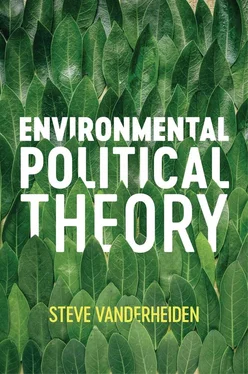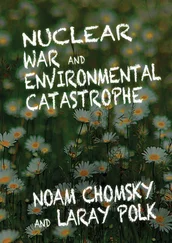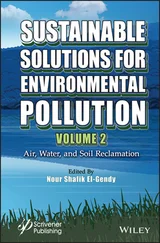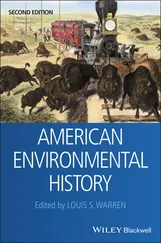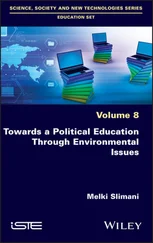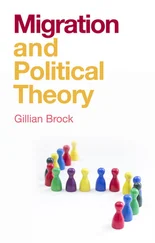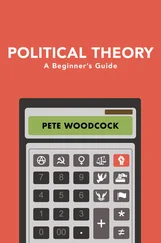160 143
161 144
162 145
163 146
164 147
165 148
166 149
167 150
168 151
169 152
170 153
171 154
172 251
173 155
174 156
175 157
176 158
177 159
178 160
179 161
180 162
181 163
182 164
183 165
184 166
185 167
186 168
187 169
188 170
189 171
190 172
191 173
192 174
193 175
194 176
195 177
196 178
197 179
198 180
199 181
200 182
201 252
202 253
203 183
204 184
205 185
206 186
207 187
208 188
209 189
210 190
211 191
212 192
213 193
214 194
215 195
216 196
217 197
218 198
219 199
220 200
221 201
222 202
223 203
224 204
225 205
226 206
227 207
228 208
229 209
230 254
231 210
232 211
233 212
234 213
235 214
236 215
237 216
238 217
239 218
240 219
241 220
242 221
243 222
244 223
245 224
246 225
247 226
248 227
249 228
250 229
251 230
252 231
253 232
254 233
255 234
256 235
257 255
258 236
259 237
260 238
261 239
262 240
263 256
264 257
265 258
266 259
ENVIRONMENTAL POLITICAL THEORY
Steve Vanderheiden
polity
Copyright © Steve Vanderheiden 2020
The right of Steve Vanderheiden to be identified as Author of this Work has been asserted in accordance with the UK Copyright, Designs and Patents Act 1988.
First published in 2020 by Polity Press
Polity Press
65 Bridge Street
Cambridge CB2 1UR, UK
Polity Press
101 Station Landing
Suite 300
Medford, MA 02155, USA
All rights reserved. Except for the quotation of short passages for the purpose of criticism and review, no part of this publication may be reproduced, stored in a retrieval system, or transmitted, in any form or by any means, electronic, mechanical, photocopying, recording, or otherwise, without the prior permission of the publisher.
ISBN-13: 978-1-5095-2961-2
ISBN-13: 978-1-5095-2962-9 (pb)
A catalogue record for this book is available from the British Library.
Names: Vanderheiden, Steve, author.
Title: Environmental political theory / Steve Vanderheiden.
Description: Cambridge, UK ; Medford, MA : Polity, 2020. | Includes bibliographical references and index. | Summary: “A systematic outline of how the environmental crisis is transforming political theory’s fundamental concepts”-- Provided by publisher.
Identifiers: LCCN 2020008758 (print) | LCCN 2020008759 (ebook) | ISBN 9781509529612 (hardback) | ISBN 9781509529629 (paperback) | ISBN 9781509529643 (epub)
Subjects: LCSH: Environmentalism--Political aspects. | Environmental policy. | Environmental ethics.
Classification: LCC JA75.8 .V36 2020 (print) | LCC JA75.8 (ebook) | DDC 320.01--dc23
LC record available at https://lccn.loc.gov/2020008758
LC ebook record available at https://lccn.loc.gov/2020008759
Typeset in 10.5 on 12pt Palatino
by Fakenham Prepress Solutions, Fakenham, Norfolk NR21 8NL
Printed and bound in Great Britain by TJ International Limited
The publisher has used its best endeavors to ensure that the URLs for external websites referred to in this book are correct and active at the time of going to press. However, the publisher has no responsibility for the websites and can make no guarantee that a site will remain live or that the content is or will remain appropriate.
Every effort has been made to trace all copyright holders, but if any have been overlooked the publisher will be pleased to include any necessary credits in any subsequent reprint or edition.
For further information on Polity, visit our website: politybooks.com
All words defined in this glossary are in boldat first occurrence in the text.
all-affected principle:under this principle, accountability binds decision makers to those affected by them by allowing the latter to hold the former to account in their decisions Anthropocene:the proposed current geological age, characterized by human activity having a dominant influence on climate and the environment biotic community:group of organisms that interact with each other in an ecosystem carbon offsets:reduction in carbon dioxide emissions to counterbalance emissions made elsewhere (for example, offsetting one’s emissions from airline travel by planting trees to sequester a comparable amount of carbon) carrying capacity:capacity of a system (usually measured in population size) to support life without ecological degradation choice architecture:design of different ways of presenting choices in terms of the behaviors that they tend to yield considerability:the status of being worthy of moral consideration consumerism:a social and economic order that encourages the private acquisition and consumption of goods and services in continually increasing amounts distributive justice:an account of justice that focuses on how laws, policies, and institutions result in unequal distributions of benefits and burdens in society, often including principles defining a just distribution ecological modernization:a school of thought within the social sciences which maintains that economic growth can be reconciled with sustainability imperatives, typically through the use of efficient technologies and design ecological steady-state:an economy with a constant stock of natural capital and stable population size that does not exceed the capacity of its ecosystem to sustainably yield resources and absorb wastes over time epistemic authority:a type of authority or persuasive power vested in certain persons by virtue of their expertise (in contrast with democratic authority, which depends on claims to represent or be responsive to the people at large); lay persons may defer to the judgment of experts or otherwise attach undue weight to their opinions on prescriptive matters due to their knowledge claims on related facts ethical holism:claim that wholes such as ecosystems have moral standing, apart from that of their individual members externality:unremunerated cost of economic exchange that is borne by neither buyer nor seller, but imposed on society at large food security:according to the FAO, “food security exists when all people, at all times, have physical and economic access to sufficient, safe and nutritious food that meets their dietary needs and food preferences for an active and healthy life” global justice integrationists:following Caney, a global justice “isolationist” applies distributive justice principles to particular goods, like greenhouse emissions, while an “integrationist” refuses to do so, insisting that such principles can apply only to whole bundles of goods (social, political, economic, environmental), such that shortages of one kind of good can be compensated with more of another green consumerism:movement or practice of buying “green” products or services in an effort to reform production processes through consumer demand, and thus to mitigate environmental degradation human exceptionalism:the belief that humans are categorically different from other animals in fact, typically used to justify differential status or treatment of nonhumans human security:protection of persons and peoples against serious threats, including violence and deprivation humanitarian intervention:use of force by a state or coalition of states against another state for the purpose of protecting human rights instrumental value:value that we attribute to things in the world because of their potential to contribute to human welfare (in contrast with intrinsic value, which is when such things are viewed as valuable in themselves) international Paretianism:condition (cast by Posner & Weisbach as a constraint on international politics) in which an international agreement advances the interests of all state parties to it and no state is made worse off by it jurisdiction:practical authority to make legal decisions and administer justice laissez faire:policy of governments to refrain from interfering in markets, e.g. through regulations to protect workers or the environment land ethic:from Leopold’s A Sand County Almanac, the ethical principle that “a thing is right when it tends to preserve the integrity, stability, and beauty of the biotic community” nation:a community of people, when conscious of its unity, desire for autonomy, and shared interests necessitous migrants:forcibly displaced migrants, whether stateless due to fleeing violence or through loss of territory, who lack a practical ability to return to their territories of origin or recent residence negative liberty:a conception in which persons are free from impediments posed by others overshoot:temporary condition of a population exceeding its carry capacity, resulting in ecological degradation and consequent reductions to or collapse of that system’s carrying capacity peoples:particular groups of persons that share features such as a common language or culture, historical residence of a place, or other distinguishing contributors to group identity popular sovereignty:principle that state authority originates in, and continues to require, popular consent positive liberty:requires that an individual have the power and resources to fulfill their potential postmaterial values:values not associated with physical or economic wellbeing; thought to manifest more strongly in persons or societies where material (i.e. related to physical or economic security) values have largely been met prior appropriation:principle that the earliest users of water for beneficial purposes have rights to continue using that water (key legal principle of water law in the American west) private sphere:domain of activity in which individual actions are considered private, to be protected from the interference of others (in contrast to the public sphere, which is properly subjected to political scrutiny) procedural legitimacy:quality of a political decision that issues from the processes by which it was made, yielding the belief by those bound by it that the decision is valid Promethean:view (named for Prometheus from Greek mythology) that technological innovation would allow humans to overcome ecological limits, making resources practically abundant remedial liability:requirement entailed by an agent’s responsibility for an outcome whereby the agent must provide some kind of remedy (e.g. compensation) for that outcome scientific racism:pseudoscientific belief that empirical evidence can justify beliefs about racial superiority or inferiority self-determination:a collective prerogative of peoples to govern themselves, protected under international law as a human right of all peoples sentience:the capacity to experience physical sensations such as pain and interpret this as an emotion Social Darwinism:social theory in which natural selection is applied to human persons and groups, and understood as a “survival of the fittest” process through which nature rewards strength and punishes weakness soft power:interventions designed to persuade or shape preferences without coercion stare decisis doctrine:legal principle of deciding cases in accordance with precedent (the Latin means “to stand by things decided”) sufficiency:idea that users of a resource are entitled to enough of some resource, but not necessarily equal shares of it (related to distributive principle of sufficientarianism, which defines a just distribution in terms of this sufficient quantity) sustainable degrowth:social movement objective for equitable reductions of production and consumption in the global North, with eventual stabilization at sustainable levels (based on critique of growth as inequitable and unsustainable) technocracy:rule by an elite comprised of technical experts, insulated from democratic/political pressures trophic diversity:biodiversity at the various levels of the food web virtual water:amount of water used to produce some good such as a commodity crop, viewed as consumed when the crop is consumed
Читать дальше
